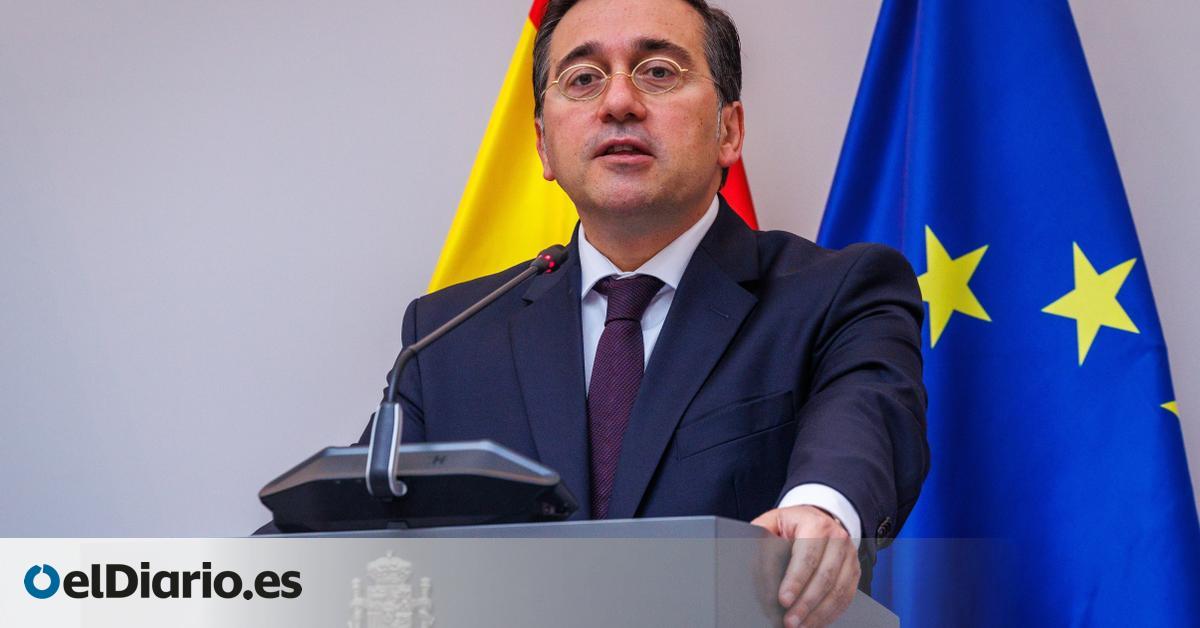
Tensions between Venezuela and Spain continue. Following the arrest of two Spaniards by the Venezuelan government on Saturday, the Ministry of Foreign Affairs has denied that Spain is involved in an operation to destabilize politics in Venezuela and has “absolutely rejected any insinuation” in this regard. It has also confirmed that the detainees are not part of the National Intelligence Center (CNI).
Announcing the arrest of the two Spaniards, from Bilbao, the Minister of the Interior and Peace, Diosdado Cabello, also claimed that Spain “was going to supply mercenaries” for an alleged operation directed by the United States. The Government of Pedro Sánchez denies all the accusations and has reiterated that it has defended “a democratic and peaceful solution to the situation in Venezuela” since the last elections.
The Ministry of Foreign Affairs said on Sunday that the Spanish Consulate in Caracas is in “permanent contact” with the relatives of the detainees. The two Spanish citizens took a flight from Madrid to the Venezuelan capital on August 17 and their families reported their disappearance to the Ertzaintza on September 9.
The former mayor of Caracas and Venezuelan opposition leader, Antonio Ledezma, has rejected the accusations against the two Spaniards on Sunday. “There is state terrorism in Venezuela. It is in the conclusions of the Inter-American Commission on Human Rights. Not only have they interfered with the freedom of Spanish citizens and those of any other latitude, they have also done so with companies,” Ledezma declared on RTVE.
Missing since last Monday
Little by little, more information is emerging about the two men arrested, accused, among other things, of being part of an operation led by the United States to assassinate Nicolás Maduro. They are José María Basoa and Andrés Martínez Adasne and were arrested in Puerto Ayacucho. Their relatives reported their disappearance to the Ertzaintza last Monday. According to the Basque Department of Security, the families of both men went to a police station to report that they had travelled to Venezuela and that “they had not been able to contact them for days”.
According to these sources, the Basque police took “the appropriate steps” and found out that both men had been arrested, which was communicated to both families, although the reason for the arrests was not given.
Andrés Martínez Adasme’s father told the newspaper El Mundo that his son and the other person arrested, both from Bilbao, were on holiday, and insisted that they are not from the CNI. The Spanish Embassy in Venezuela is waiting to have access to the two detainees, accused of terrorism, to verify their identities and nationality and, if they are Spanish citizens, to know exactly what they are accused of and to ensure that they can receive all the necessary assistance.
The Spanish Embassy in Venezuela has asked the Maduro government to have access to the two detainees, accused of terrorism, to verify their identities and provide them with the necessary assistance. Their families are in permanent contact with the Ministry of Foreign Affairs and the Spanish Consulate in Caracas, as well as with the Basque Government.
The PP has denounced that the Government has not informed it about the arrests, which it sees as evidence that the PSOE “has a better relationship with the Maduro regime than with Alberto Núñez Feijóo’s Popular Party,” in the words of its deputy secretary for Mobilization and Digital Challenge, Noelia Núñez.
Borrell calls Venezuela a “dictatorial regime”
In this context, the High Representative of the European Union for Foreign Affairs, Josep Borrell, has described Venezuela as a “dictatorial and authoritarian regime”, alluding to the arbitrary arrests or the fact that the opposition leader, Edmundo González, has had to flee the country and request political asylum in Spain.
The head of European diplomacy has pointed out that by saying that Venezuela is a dictatorial regime “we are not fixing anything”, and that fixing things sometimes requires “a certain verbal restraint”.
“But let’s not fool ourselves about the nature of things. Venezuela has called elections, but it was not a democracy before and it is even less so after,” he added in statements to Telecinco.
His words have led the PP to ask the head of the Executive to follow in his footsteps. “Come on, Sánchez. It’s not that difficult. You can do it too. Or maybe not. A minimum of moral clarity is enough,” said the PP deputy Cayetana Álvarez de Toledo on her X account.
The PP continues to put pressure on Pedro Sánchez’s government to consider Venezuela a dictatorship, at a time of diplomatic crisis, after Maduro’s government summoned the Spanish ambassador in Caracas and called its representative in Madrid for consultations, after the Minister of Defense, Margarita Robles, described this Caribbean country as a dictatorship.
Feijóo’s party will continue to demand that the Government recognise Edmundo González Urrutia as the elected president of Venezuela. Congress has already urged this recognition to be adopted, with the votes of PP, Vox and PNV, and this week the Senate will also do so, where the Popular Party has an absolute majority.
The debate on Venezuela will also take place on Tuesday in the European Parliament, where two groups are calling for the opposition leader to be recognised as president-elect and a resolution will be voted on next Thursday.
Neither Spain nor the EU have recognised the victory attributed to Nicolás Maduro as legitimate, as the electoral records proving it have not been published, although they have not recognised González Urrutia as the legitimate winner of the Venezuelan elections either.
Asylum for Edmundo Gonzalez
This new episode in the crisis between Spain and Venezuela comes six days after opposition leader Edmundo González travelled to Spain and was granted asylum in the country by Pedro Sánchez’s government. A trip that took place after eight intense days of negotiations between the different parties, in which former president José Luis Rodríguez Zapatero played a key role.
Negotiations that were criticised by the Popular Party, which accused the government of being “an accomplice to the Bolivarian dictatorship”. On Wednesday, with the positive vote of the PNV, a non-legislative proposal from the PP was approved, which left the Government in a minority and in which it was urged to recognise González Urrutia as “president-elect”.
Hours later, the president of the Venezuelan Assembly asked the Foreign Affairs Committee to approve a resolution urging the Maduro government to “break” relations with Spain. And on Thursday night, Venezuela recalled its ambassador in Madrid for consultations while describing as “interventionist” statements by the Spanish Minister of Defense, Margarita Robles, in which she described Venezuela as a “dictatorship.”
Source: www.eldiario.es

